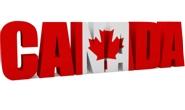Canada

March 11, 2018
Canada Mills Get Temporary Reprieve
Written by Sandy Williams
Canadian steel mills like Algoma and Stelco are getting a reprieve from steel and aluminum tariffs, at least for now. The Section 232 tariffs imposed by President Trump will not affect Canada or Mexico provided they can complete a NAFTA agreement quickly and on U.S. terms. “For now, Canada and Mexico will be excluded from the tariffs,” said a senior White House official. “But it’s not open-ended.”
The threat of future tariffs is still a concern and seen by some as a negotiating tool by the U.S. “Today is a step forward,” said Foreign Affairs Minister Chyrstia Freeland. She added tariffs and NAFTA are “quite distinct issues,” and that work continues “until the prospect of these duties is fully and permanently lifted.
“Our approach [to NAFTA] has been consistent since the negotiations began last year. Today’s announcement does not change that. We know a fair deal — a win-win-win deal — is within reach,” said Freeland.
Unifor, a union that represents members of Canada’s auto, aluminum and steel sectors, called the exemption “simply a stay of execution.”
“This isn’t a victory, it’s a threat,” said Unifor National President Jerry Dias. “The American government has taken our industries and workers captive with the expectation that Canada will pay the NAFTA ransom, except it has no leverage,” he said. “The reason Trump offered an exclusion in the first place is because the U.S. realizes that it can’t strike us without hitting themselves.”
A statement by Sault Ste. Marie MP Terry Sheehan said, “We must continue to hold the line, so that Canada remains excluded from these tariffs permanently.” He added, “Any re-introduction of tariffs into the North America Free Trade Agreement negotiations is unacceptable.”
Steel producers welcomed the exemption, but expressed concern that foreign steel will be diverted to Canada because of the global tariffs by the U.S.
Algoma CEO Kalyan Ghosh said the company is a strong advocate for free trade. “Today’s announcement excluding Canada from the Section 232 tariff recognizes the importance of our trade relationship with the U.S. and ensures our highly integrated supply chain can continue unimpeded,” said Ghosh. He called for modernization of the trade remedy system in Canada to address the “risk of unfairly diverted steel tons into our domestic market.”
The Canadian Steel Producers Association also welcomed the exemption. “We continue to support the dialogue between Canadian and U.S. governments to ensure our integrated markets remain open and that our respective supply chains collectively grow, while continuing to address global steel excess capacity issues,” said CSPA. “We do remain concerned about potential diversion of offshore steel to the Canadian market as a result of Section 232-related actions.”






